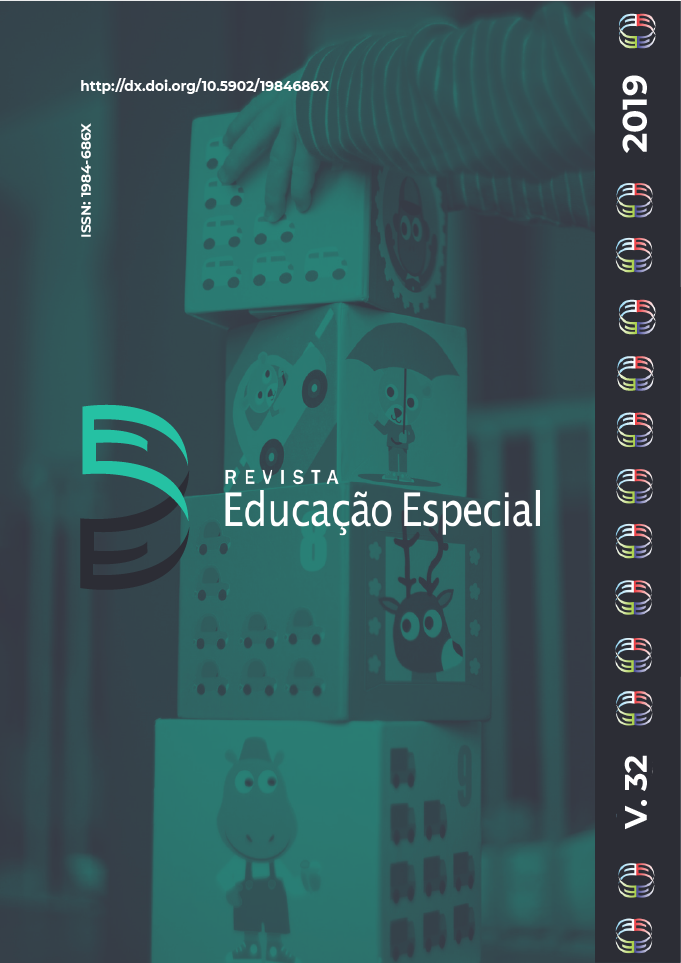Musical and artistic practices with disabled children and young people: possibilities and challenges
DOI:
https://doi.org/10.5902/1984686X32655Keywords:
Social practices and educational processes, Musical and artistic practices, Disabled children and young people.Abstract
This paper aims at sharing the outcomes obtained from research carried out with the community of an extension project developed in the Parents and Friends of Disabled Children Association of Ituiutaba (APAE), whose goal was to try to understand the way disabled children and young people engage in musical and artistic practices and which are the educational processes derived from such practices. The research building process held two moments: intervention methodology and research methodology; having the pedagogical principles of Paulo Freire as a reference. The theoretical reference mainly sustained itself on the social practice and intercultural concepts. Of a qualitative nature and phenomenological inspiration, the main data collection tool were the field journals, besides photographs, filming footages, drawings, written texts and interviews, which were all later analyzed (ideographically and nomothetically). Three categories were identified: A) Want to do; B) Know how to do; C) Consider others. The performance construction in musical and artistic practices with disabled children and young people showed their latent power in light of the educational processes derived from them. As protagonists, it was possible to tell and retell stories, memorize lines, learn songs, percuss sonorous objects, Interact with the people and institutions involved (APAE, day care, music school and university), learn new contents, methodologies and ways to express oneself. Such practices may contribute to the formation process of disabled people; ensure the exercise of their rights; raise reflection and constitute themselves as integrating parts of the formation process (personally and professionally) in Special EducationDownloads
References
BARBOSA, Ana Mae. A multiculturalidade na educação estética. In: Africanidades brasileiras e educação: Salto para o Futuro. TRINDADE, Azoilda L. (Org.). Rio de Janeiro: ACERP; Brasília: TV Escola, 2013, p. 220-225. Disponível em: <https://pt.scribd.com/document/207338664/Livro-Africanidades-Brasileiras-Educacao>. Acesso em: jan. 2018.
BOGDAN, Robert; BIKLEN, Sari. Investigação qualitativa em educação: uma introdução à teoria e aos métodos. Porto: Porto, 1994.
CASTIANO, José. P. Referenciais da filosofia africana: em busca da intersubjectivação. Maputo: Sociedade Editorial Ndjira. 2000.
CANDAU, Vera Maria. Direitos Humanos, educação e interculturalidade: as tensões entre igualdade e diferença. Revista Brasileira de Educação. Rio de Janeiro, v. 13, n. 37, p. 45-56, jan-abr, 2008. Disponível em: . Acesso em: jan. 2018. DOI: https://doi.org/10.1590/S1413-24782008000100005
FREIRE, Paulo. Pedagogia do oprimido. 42. ed. Rio de Janeiro: Paz e Terra, 2005.
FREIRE, Paulo. Educação como prática da liberdade. Rio de Janeiro: Paz e Terra, 1967.
GARNICA, Antonio Vicente Marafioti. Algumas notas sobre pesquisa qualitativa e fenomenologia. Interfaces. Botucatu, n. 1, p. 109-122, 1997. Disponível em: <http://www.scielo.br/pdf/icse/v1n1/08.pdf>. Acesso em: jan. 2018. DOI: https://doi.org/10.1590/S1414-32831997000200008
GÓES, Maria Cecília Rafael de. Relações entre desenvolvimento humano, deficiência e educação: contribuições da abordagem histórico-cultural. In: OLIVEIRA, M.K.; SOUZA, D.T.R.; REGO, T.C. Psicologia, educação e as temáticas da vida contemporânea. São Paulo: Editora Moderna, 2002, p.95-114.
GONÇALVES JUNIOR, Luiz. Dialogando sobre a Capoeira: possibilidades de intervenção a partir da motricidade humana. Motriz. Rio Claro, v. 15, n. 3, p. 700-707. jul./set. 2009.
IVIC, Ivan. Lev Semionovich Vygotsky (1896-1934). In: IVIC, Ivan; COELHO, Edgar Pereira (Orgs.). Lev Semionovich Vygotsky. Recife: Fundação Joaquim Nabuco, Massangana, 2010. p. 11-34.
KATER, Carlos. O que podemos esperar da educação musical em projetos de ação social. In: Revista ABEM. Porto Alegre: Associação Brasileira de Educação Musical, n.10, p. 43-51, 2004.
LARROSA-BONDÍA, Jorge. Notas sobre a experiência e o saber de experiência. Revista Brasileira de Educação. Rio de Janeiro, n.19, p. 20-28, 2002. Disponível em: <http://www.redalyc.org/pdf/275/27501903.pdf>. Acesso em: jan. 2018. DOI: https://doi.org/10.1590/S1413-24782002000100003
LOPES, José de Souza Miguel. Cultura acústica e letramento em Moçambique: em busca de fundamentos antropológicos para uma educação intercultural. São Paulo: EDUC, 2004.
MACHADO, Ozeneide. V. M. Pesquisa qualitativa: modalidade fenômeno situado. In: BICUDO, Maria Aparecida V.; ESPOSITO, Vitória Helena C. (Orgs.). A pesquisa qualitativa em educação: um enfoque fenomenológico. Piracicaba: UNIMEP, 1994. p. 35-46.
MARTINS, Joel; BICUDO, Maria Aparecida Viggiani. A pesquisa qualitativa em psicologia: fundamentos e recursos básicos. 5. ed. São Paulo: Centauro, 2005.
MASCARENHAS, Luciana. No céu, na terra ou no mar. São Paulo: Chiado. 2014, il. color.
OLIVEIRA, Maria Waldenez et al. Processos educativos em práticas sociais: reflexões teóricas e metodológicas sobre pesquisa educacional em espaços sociais. In: OLIVEIRA, Maria Waldenez; SOUSA, Fabiana R. (Orgs.). Processos educativos em práticas sociais: pesquisas em educação. São Carlos: EdUFSCar, 2014. p. 29-46.
PEDERIVA, Patrícia Lima Martins; TRISTÃO, Rosana Maria. Música e cognição. Ciências & Cognição. Rio de Janeiro, v. 9, p. 83-90, 2006. Disponível em: <http://www.cienciasecognicao.org/revista/index.php/cec/article/view/601/383>. Acesso em: jan. 2018.
SIEMS, Maria Edith Romano. Educação de jovens e adultos com deficiência: saberes e caminhos em construção. Educação em foco, Juiz de Fora, v. 16, n. 2, p. 61-79, 2011. Disponível em: <http://www.ufjf.br/revistaedufoco/files/2012/08/Texton-031.pdf>. Acesso em: jan. 2018.
Downloads
Published
How to Cite
Issue
Section
License
Declaration of originality
We declare that all articles present in the journal Revista Educação Especial (UFSM) are originals and were not submitted for publishing on any other publication, as a whole or a fraction. We also declare that, after being published by Revista Educação Especial (UFSM), a paper will not be submitted to another journal within two years. After this time, our journal transfers the publishing rights to the authors, with a permit granted by the Editorial Council.
We also acknowledge that the originals’ submission to Revista Educação Especial (UFSM) implies on a transference of copyright for physical and digital publishing to the journal. In case of noncompliance, the violator will receive sanctions and penalties predicted by the Brazilian Copyright Protection Law (n. 9610, dated 19/02/98).







